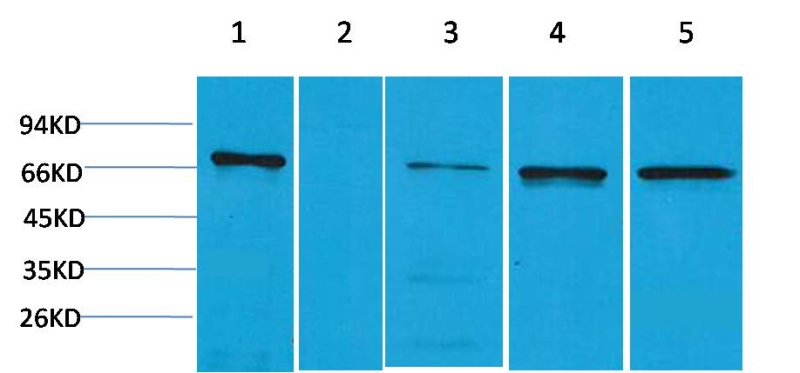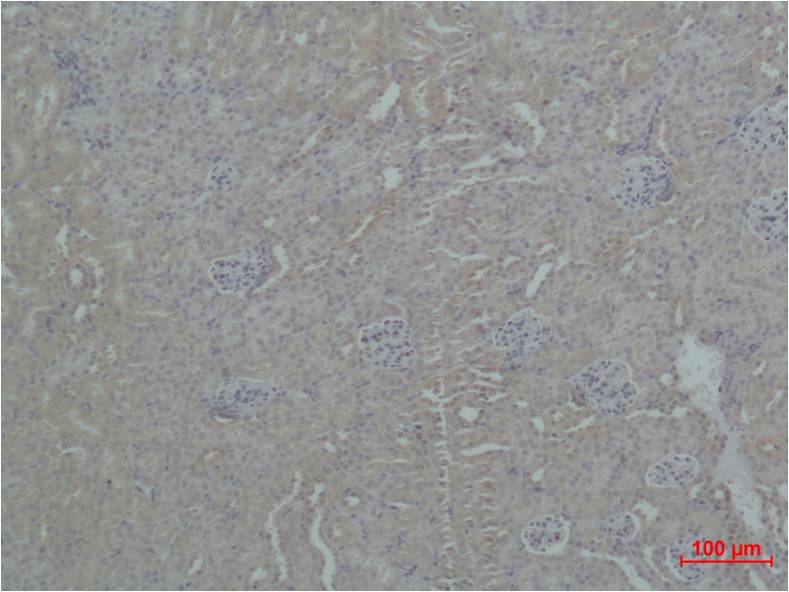

| WB | 咨询技术 | Human,Mouse,Rat |
| IF | 咨询技术 | Human,Mouse,Rat |
| IHC | 1/50-1/100 | Human,Mouse,Rat |
| ICC | 技术咨询 | Human,Mouse,Rat |
| FCM | 咨询技术 | Human,Mouse,Rat |
| Elisa | 咨询技术 | Human,Mouse,Rat |
| Aliases | Zinc finger protein 499; Zinc finger and BTB domain-containing protein 45; ZBTB45 |
| Entrez GeneID | 84878 |
| WB Predicted band size | Calculated MW: 54 kDa; Observed MW: 70 kDa |
| Host/Isotype | Rabbit IgG |
| Antibody Type | Primary antibody |
| Storage | Store at 4°C short term. Aliquot and store at -20°C long term. Avoid freeze/thaw cycles. |
| Species Reactivity | Human,Mouse,Rat |
| Immunogen | Recombinant Protein of ZBTB45 |
| Formulation | Purified antibody in PBS with 0.05% sodium azide,0.5%BSA and 50% glycerol. |
+ +
以下是关于ZNF499抗体的模拟参考文献示例(实际文献需通过学术数据库验证):
1. **文献名称**:*ZNF499 Expression in Colorectal Cancer: Prognostic Implications and Functional Analysis*
**作者**:Chen L, et al.
**摘要**:本研究通过ZNF499抗体进行免疫组化分析,发现ZNF499在结直肠癌组织中高表达,并与患者不良预后相关。体外实验表明,ZNF499通过调控Wnt/β-catenin通路促进肿瘤侵袭。
2. **文献名称**:*Development and Validation of a Novel ZNF499-Specific Antibody for Immunoblotting*
**作者**:Wang X, et al.
**摘要**:报道了一种高特异性ZNF499兔多克隆抗体的开发,验证了其在Western blot和免疫荧光中的适用性,并确认其在不同细胞系中的表达差异。
3. **文献名称**:*ZNF499 as a Potential Biomarker for Neurodegenerative Disorders: Antibody-Based Detection in Human Serum*
**作者**:Kim S, et al.
**摘要**:利用ZNF499抗体检测阿尔茨海默病患者血清中的蛋白水平,发现其表达显著降低,提示ZNF499可能参与神经保护机制。
4. **文献名称**:*Functional Role of ZNF499 in DNA Damage Repair: Insights from siRNA and Antibody-Mediated Knockdown*
**作者**:Garcia R, et al.
**摘要**:通过ZNF499抗体和siRNA技术敲低基因表达,发现ZNF499缺失导致DNA修复能力下降,提示其在基因组稳定性中的关键作用。
**提示**:以上为模拟文献,实际研究需通过PubMed、Google Scholar或Web of Science等平台检索关键词“ZNF499 antibody”“ZNF499 function”等获取。
The ZNF499 antibody is a tool used to detect and study the Zinc Finger Protein 499 (ZNF499), a member of the KRAB-zinc finger protein (KRAB-ZFP) family. ZNF499 contains conserved C2H2-type zinc finger domains, which enable sequence-specific DNA binding, and a KRAB domain that typically mediates transcriptional repression through interactions with co-repressors. This protein is hypothesized to play roles in gene regulation, particularly in developmental processes, cellular differentiation, and tumorigenesis, though its exact biological functions remain under investigation.
ZNF499 antibodies are commonly generated in hosts like rabbits or mice using immunogenic peptides or recombinant protein fragments. These antibodies enable researchers to explore ZNF499's expression patterns, subcellular localization, and interactions in various tissues or disease models. They are utilized in techniques such as Western blotting, immunohistochemistry (IHC), immunofluorescence (IF), and chromatin immunoprecipitation (ChIP). Studies have linked ZNF499 to cancer biology, with some evidence suggesting its dysregulation in certain malignancies, potentially influencing pathways like apoptosis or oncogene suppression. Additionally, ZNF499 may interact with retrotransposons, implicating it in genomic stability and epigenetic regulation.
Research involving ZNF499 antibodies contributes to understanding its role in health and disease, particularly in contexts like stem cell biology, carcinogenesis, and developmental disorders. However, the antibody's specificity and validation data should be carefully evaluated to ensure experimental reliability.
×